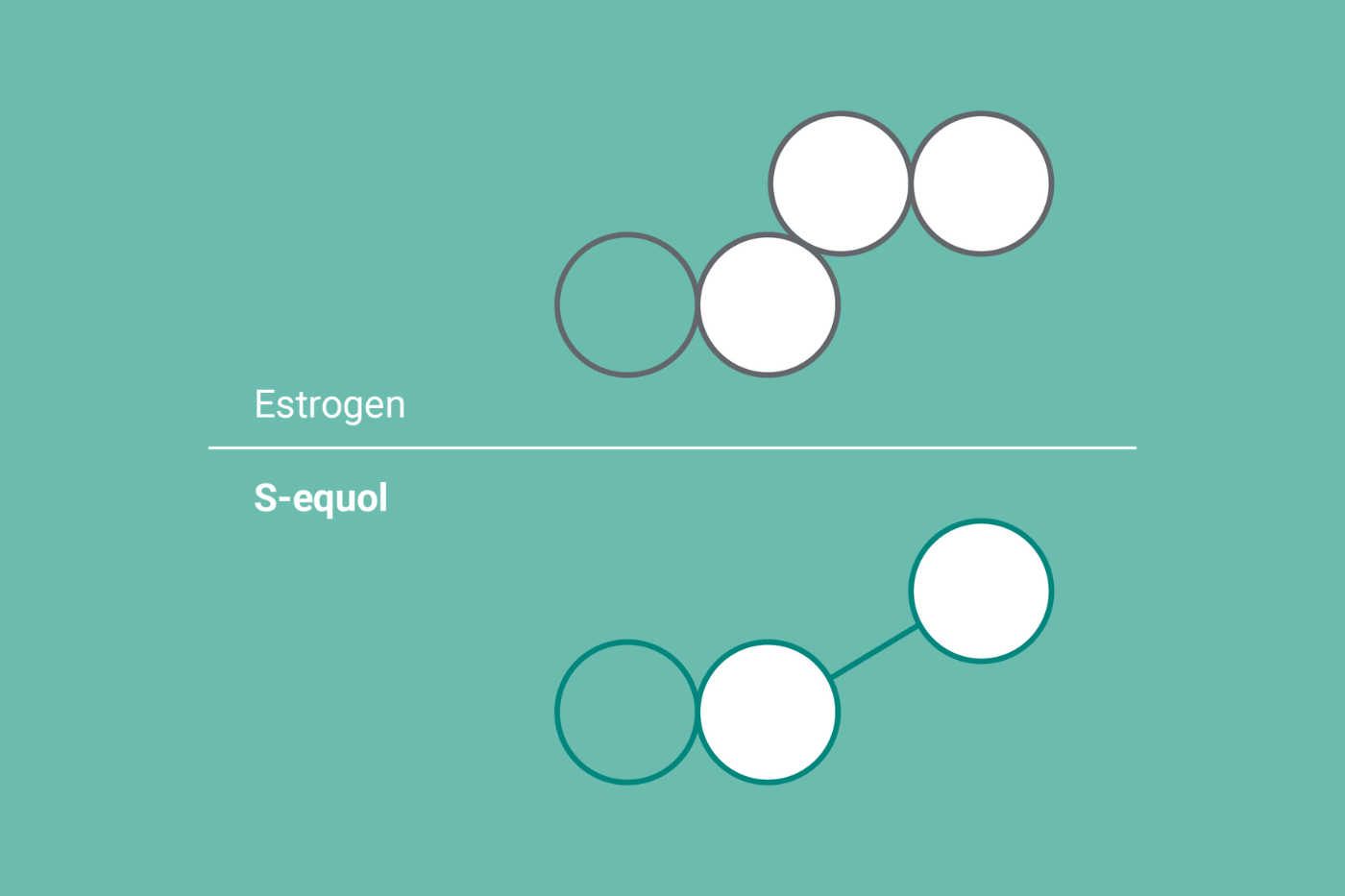
S-Equol
Menopause is the time in a woman’s reproductive life that signifies the end of her menstrual cycle. It officially begins after a woman has gone one year without a period. Typically, menopause begins between the ages of 51 and 52¹.
While there may be a characteristic increase in wisdom and confidence in this age bracket, menopause can also come with uncomfortable symptoms that can interfere with everyday life.
There are various options available for menopause symptoms out on the market, but not all of them are backed by science. Fortunately, S-equol, a metabolite of a soy isoflavone, is a reliable estrogen-mimicking compound that is supported by scientific literature².
What Are Soy Isoflavones?
Soy isoflavones are a class of phytoestrogens, a plant-based compound that have a similar structure of estrogen in the body.
Isoflavones are present in a variety of foods, but soybeans and soy food products have the highest concentration of them on average.
Because of their shape, soy isoflavones have estrogenic effects that can help alleviate menopause symptoms like hot flashes³.
Soy isoflavones also have an antiestrogenic effect that may help reduce the incidence of hormone-related cancers such as:
- Breast cancer
- Prostate cancer in men⁴
After consuming soy products, some intestinal bacteria can convert soy isoflavones into S-equol, a more powerful metabolite of soy isoflavones daidzein. However, not everyone can produce S-equol on their own.
Individuals who have this S-equol-producing bacteria may experience more significant effects from consuming soy isoflavones than those who don't.
In fact, studies show that the rate of S-equol producers within Asian populations is about 50-55% due to their long-term consumption of soy.⁵ This is about double the rate for the Western population.
Common Symptoms Of Menopause
Characterized by a drop in estrogen production, menopause can be a delicate period in a woman’s reproductive life cycle.
As the woman's body adjusts to this new change, she may experience common menopause symptoms such as:
- Irregular period
- Vaginal dryness
- Mood swings
- Irritability
- Hot flashes and night sweats
- Slowed metabolism, weight gain, difficulty shedding extra weight
- Dry and thinning skin
- Sleep disturbances and insomnia⁶
Of course, every woman might experience menopause slightly differently. Some may experience all symptoms, while others may only experience a few and in varying intensities.
If you’re experiencing any of these symptoms, it’s a good idea to speak with your healthcare professional to ensure you’re dealing with menopause and not other hormone-related issues.
How S-Equol Helps Alleviate Menopause Symptoms
S-equol is a non-hormonal compound derived from soy isoflavones. It's naturally derived from daidzein, a soy isoflavone.
In recent years, S-equol has gained popularity as an option for alleviating menopause symptoms.
Two milestone studies show the perks of this soy isoflavone for women undergoing menopause.
The first study included 160 Japanese women, none of whom produced S-equol and had them either take 10mg of s-equol, or a placebo pill. Researchers discovered significant positive effects in the group taking s-equol in hot flash reduction and muscle stiffness decreases⁷.
In a U.S. study of 102 menopausal women, participants who took S-equol had relief from joint and muscle pain and saw a reduction in hot flash frequency⁸.
These studies both suggest that the power of S-equol is promising, especially for women who can’t fully reap the benefits of consuming soy isoflavones on their own⁷,⁸.
Supplements containing S-equol can help mimic some of the beneficial effects of estrogen to alleviate symptoms like hot flashes. Many women find that non-hormonal and low-risk solutions like these are a great option for keeping unwanted symptoms at bay.
Resources:
- Peacock, K., & Ketvertis, K. M. (2022, August 11). Menopause. National Center for Biotechnology Information. Retrieved November 29, 2022, from https://www.ncbi.nlm.nih.gov/books/NBK507826/
- Chen, L.-R., Ko, N.-Y., & Chen, K.-H. (2019, November 4). Isoflavone supplements for menopausal women: A systematic review. Nutrients. Retrieved November 29, 2022, from https://www.ncbi.nlm.nih.gov/pmc/articles/PMC6893524/
- Linus Pauling Institute. (2022). “Soy Isoflavones.” Retrieved 25 Nov. 2022 from https://lpi.oregonstate.edu/mic/dietary-factors/phytochemicals/soy-isoflavones
- Sarkar FH, Li Y. Soy isoflavones and cancer prevention. Cancer Invest. 2003;21(5):744-57. doi: 10.1081/cnv-120023773. PMID: 14628433.
- Liu, B., Qin, L., Liu, A., Uchiyama, S., Ueno, T., Li, X., & Wang, P. (2010, July 24). Prevalence of the Equol-producer phenotype and its relationship with dietary isoflavone and serum lipids in healthy Chinese adults. Journal of epidemiology. Retrieved November 29, 2022, from https://www.ncbi.nlm.nih.gov/pmc/articles/PMC3900832/
- Santoro, N., Epperson, C.N., & Mathews, S.B. (2015). Menopausal Symptoms and Their Management. Endocrinol Metab Clin North America, 44(3), p. 497-515. doi: 10.1016/j.ecl.2015.05.001. PMID: 26316239; PMCID: PMC4890704.
- Aso T, Uchiyama S, Matsumura Y, Taguchi M, Nozaki M, Takamatsu K, Ishizuka B, Kubota T, Mizunuma H, Ohta H. A natural S-equol supplement alleviates hot flushes and other menopausal symptoms in equol nonproducing postmenopausal Japanese women. J Womens Health (Larchmt). 2012 Jan;21(1):92-100. doi: 10.1089/jwh.2011.2753. Epub 2011 Oct 12. PMID: 21992596.
- Jenks, B.H. et al. (2012). A Pilot Study on the Effects of S-Equol Compared to Soy Isoflavones on Menopausal Hot Flash Frequency. Journal of Women's Health, p. 674-682. http://doi.org/10.1089/jwh.2011.3153


